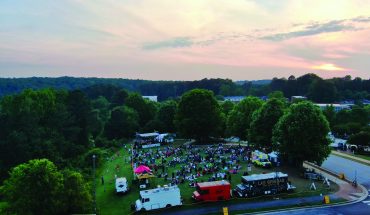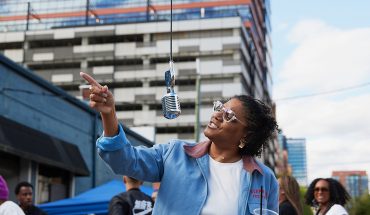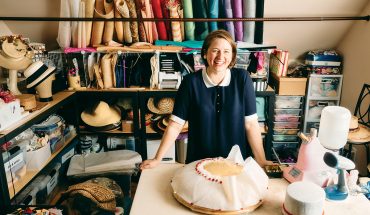
Billy Dunlap, Brenda Gibson, and Thad Woodard, chairs of the capital campaign for Transitions LifeCare.
by Todd Cohen
photograph by Jill Knight
Life can unfold and conclude with a mysterious kind of symmetry.
Brenda Gibson’s mother, Violet Chappell, once longed to be a nurse. She worked at Duke University Hospital for 17 years but, lacking a nursing education, ended up managing the operating supply room. At age 15, Gibson was also drawn to health care, volunteering as a candy striper at Wake County Memorial Hospital, now WakeMed. She currently chairs its board of directors.
In 2012, when Chappell, then 92, was dying of congestive heart failure, Gibson served as her primary caregiver. After her mother was admitted to WakeMed four times in six months, Gibson arranged for her to receive home visits at least once a week from the nonprofit Transitions LifeCare, formerly Hospice of Wake County.
“There was no way I could have dealt with it, as emotional as I was, without them,” Gibson says of Transitions LifeCare. “It kept her from having to go back to the hospital. Everything she needed, they provided.”
Today, Gibson is one of three co-chairs of a capital campaign that aims to raise $6 million to expand Transitions LifeCare’s 20-room facility with 10 new patient rooms and other spaces to allow it to serve another 500 patients and their families each year. In the five years since it opened its Hospice Home, known as the William M. Dunlap Center for Caring, Transitions LifeCare has served over 3,000 patients and their families. The complex also is home to a spiritual sanctuary, grief center, and administration building.
Co-chairing the campaign with Gibson are Dr. Billy Dunlap, a retired oncologist who co-founded Hospice of Wake County, and Thad Woodard, retired president and CEO of the North Carolina Bankers Association.
Dunlap, 76, a South Carolina native, moved to Raleigh as a young child in 1943. He is a graduate of UNC-Chapel Hill and the School of Medicine at Duke University, and served in the U.S. Army Medical Corps at Hunter Army Airfield in Savannah for two years during the Vietnam War. In 1973, he started practicing medicine in Raleigh with Robert Bilbro and Allan Eure. The practice became Raleigh Medical Group, the largest internal medicine group in Raleigh. Dunlap lives in Hayes Barton with his wife, Shawnee Sundquist, a nurse at Rex Healthcare. He has two grown children and six grandchildren.
Woodard, 70, a Raleigh native, was raised in Selma in Johnston County and moved to Raleigh at 12. A graduate of Pfeiffer College, now Pfeiffer University, he served in the U.S. Army and worked in the mortgage industry, and then the gubernatorial campaign of Hargrove “Skipper” Bowles, who lost the 1972 election to James Holshouser. Woodard was one of the first 12 employees at State Bank of Raleigh, then worked for a year as vice president of development at Pfeiffer before joining the North Carolina Savings and Loan League as CEO. After its 1997 merger with the Bankers Association, he continued to serve as CEO. He lives near North Hills with his wife, Jan, who chairs the Duke Raleigh Hospital Guild. He has two married daughters who live in Greensboro and Cleveland, Ohio, and two grandchildren.
Gibson, 59, a Raleigh native, worked for Wachovia and BB&T before joining Highwoods Properties in 1985 as a commercial real estate broker. Since 2003, she has worked as an independent commercial broker. She is a former board chair for the WakeMed Foundation, and co-chaired its 2011 capital campaign that raised $50 million to build WakeMed’s first children’s hospital. She lives in North Raleigh with her husband, Ron Gibson, founder and retired CEO of Highwoods. They have a grown daughter. He also has a daughter from a previous marriage and two grandchildren.
What was the genesis of Hospice of Wake County?
Billy Dunlap: The hospice movement was only about 12 or 13 years old worldwide when we started working on our program. There was a meeting in Research Triangle Park in 1978 to form a hospice in the Triangle. There were only three in the state at that time. I had to look up the word “hospice.” I was practicing oncology about 75 percent of the time and lost a lot of patients. I knew we needed a better way to take care of people in the final stages of life.
Why does Transitions LifeCare matter?
Billy Dunlap: It makes the end of life easier for the patients and families. When you call hospice, immediately they begin to take over care of the patient. The referring physician can still be involved. For a home patient, first you get the nurse, who goes into the home and almost immediately makes the patient and especially the family feel more comfortable and know they can reach them any time by picking up the phone. And the social worker makes frequent calls and helps iron out issues they might not even have thought about, like financial issues and making contact with a funeral home. If necessary, and it frequently is, a home health aide is provided to go in in the morning and help the patient get up and get bathed and get dressed and get breakfast. And other people are available if necessary, such as a chaplain. We provide bereavement care for over a year for any family after they’ve lost a loved one. Bereavement serves the whole area, even people not under hospice care.
Brenda Gibson: We don’t turn away people. Some of our patients might be people who are homeless or someone with a spouse with dementia, and those people can’t be taken care of at home.
Thad Woodard: I’ve seen the end of life with a number of people, including my wife’s mother, and my mother and father. I don’t think anybody is ever prepared for it, no matter how it comes or where they are. At Transitions LifeCare, the people are there solely because they care. The individual and the family can find a certain peace.
Death can be a taboo topic in American culture. How is Transitions LifeCare helping people and their families deal with the idea of death?
BG: Most people are scared of death and to talk about it. We help you plan your living will and health-care power of attorney. If you don’t plan for it, you put a lot of burden on your family to make decisions for you.
TW: They want to make that path easier. They know the way.
BD: We make people and families understand a little better that death is just another stage of life. In 1978, not a single dying person in Wake County received hospice care. Now, nearly 50 percent who are dying are served by some hospice program.
What does philanthropy mean to you?
BG: I love giving back. My mother loved doing for others. Ron and I donated money for the new family waiting room in the new wing of Hospice Home, and it will be dedicated to her.
TW: Utilizing your blessings and giving back for the benefit of others.
BD: Helping the community by giving as much as you can possibly give.
What are your favorite causes?
BG: Our church, WakeMed, and Transitions. Our church, Hayes Barton United Methodist, has a $12 million capital campaign so we can do more outreach and ministry work. I’m working on major gifts.
TW: Hospice, Boys and Girls Clubs, Hayes Barton United Methodist Church, Camp Challenge, Oakwood Cemetery, Warmth for Wake.
BD: Hospice/Transitions and Boys and Girls Clubs of Wake County. I’ve been on that board for 26 years.



